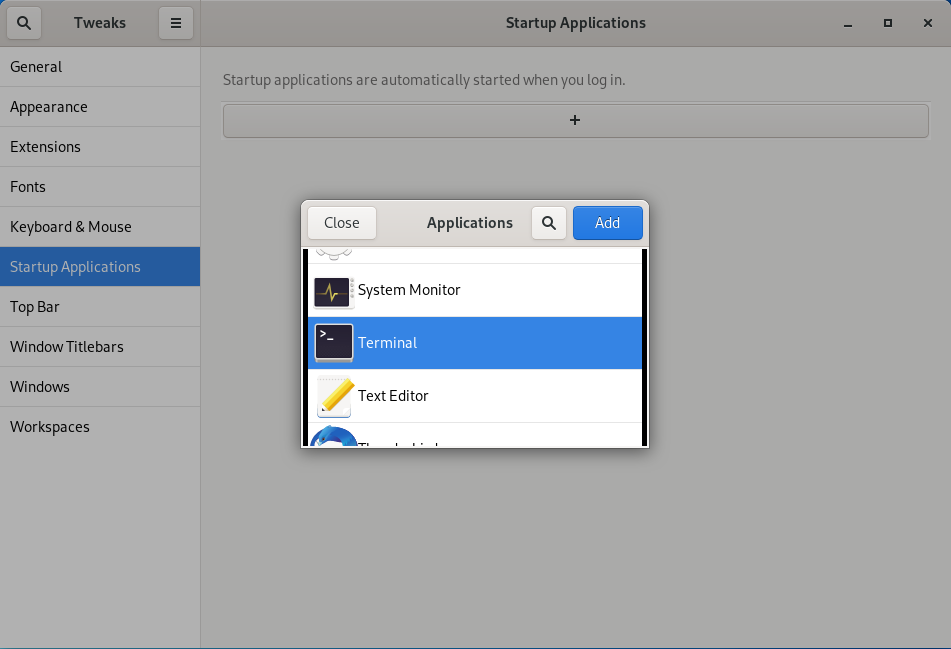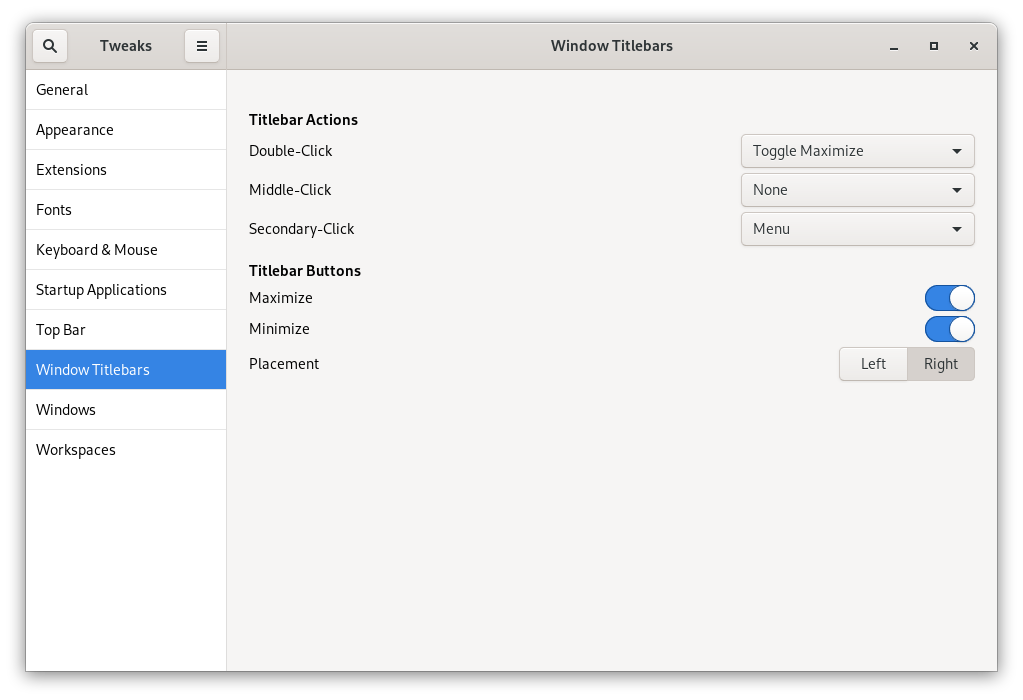No edit summary |
No edit summary |
||
| (15 intermediate revisions by the same user not shown) | |||
| Line 1: | Line 1: | ||
= Examples for GNOME settings. = | |||
== manage applications on startup in GNOME 3 == | == manage applications on startup in GNOME 3 == | ||
| Line 33: | Line 33: | ||
== titlebar buttons == | == titlebar buttons == | ||
With tool <code>gnome-tweaks</code> it is also easy to switch the buttons 'Minimize' and 'Maximize' | With the tool <code>gnome-tweaks</code> it is also easy to switch on the buttons 'Minimize' and 'Maximize' in the titlebar of windows. | ||
[[File: | [[File:Titlebarbuttons.png|center|Set the Minimize and Maximize Buttons in Titlebar]] | ||
As well with the command <code>gsettings</code> you can also change the button-layout to add 'Minimize' and 'Maximize' | |||
<pre> | |||
$ gsettings set org.gnome.desktop.wm.preferences button-layout 'appmenu:minimize,maximize,close' | |||
</pre> | |||
or check the setting: | |||
<pre> | |||
$ gsettings get org.gnome.desktop.wm.preferences button-layout | |||
'appmenu:minimize,maximize,close' | |||
$ | |||
</pre> | |||
== extensions == | |||
By default shell extensions are disabled. So first you need to [https://i.stack.imgur.com/j4CiW.gif allow user-extensions] , before you can use it. | |||
The appropriate command to general switch on extensions is: | |||
<pre> | |||
$ gsettings set org.gnome.shell disable-user-extensions false | |||
</pre> | |||
My favorite extension is 'Dash to Dock'. Fedora provides the package <code>gnome-shell-extension-dash-to-dock</code> for it. By default this package is not installed with the GNOME desktop. | |||
<pre> | |||
# dnf install -y gnome-shell-extension-dash-to-dock | |||
</pre> | |||
== login automatic == | == login automatic == | ||
Latest revision as of 13:11, 12 January 2021
Examples for GNOME settings.
manage applications on startup in GNOME 3
Startup applications are automatically started when you log in. With the program gnome-tweaks you can easily manage startup applications.
After the program gnome-tweaks is installed
# dnf install gnome-tweaks
you can start it:
$ gnome-tweaks
The following picture shows the adding of an automatic start of a terminal emulation with the program gnome-tweaks after log in.

This generates the file: ~/.config/autostart/org.gnome.Terminal.desktop
From the directory /usr/share/applications you can also simple copy desktop-files:
$ cp /usr/share/applications/org.gnome.Terminal.desktop ~/.config/autostart/
titlebar buttons
With the tool gnome-tweaks it is also easy to switch on the buttons 'Minimize' and 'Maximize' in the titlebar of windows.

As well with the command gsettings you can also change the button-layout to add 'Minimize' and 'Maximize'
$ gsettings set org.gnome.desktop.wm.preferences button-layout 'appmenu:minimize,maximize,close'
or check the setting:
$ gsettings get org.gnome.desktop.wm.preferences button-layout 'appmenu:minimize,maximize,close' $
extensions
By default shell extensions are disabled. So first you need to allow user-extensions , before you can use it.
The appropriate command to general switch on extensions is:
$ gsettings set org.gnome.shell disable-user-extensions false
My favorite extension is 'Dash to Dock'. Fedora provides the package gnome-shell-extension-dash-to-dock for it. By default this package is not installed with the GNOME desktop.
# dnf install -y gnome-shell-extension-dash-to-dock
login automatic
Edit the /etc/gdm/custom.conf file and make sure that the [daemon] section in the file specifies the following:
[daemon] AutomaticLoginEnable=True AutomaticLogin=username
This category currently contains no pages or media.

